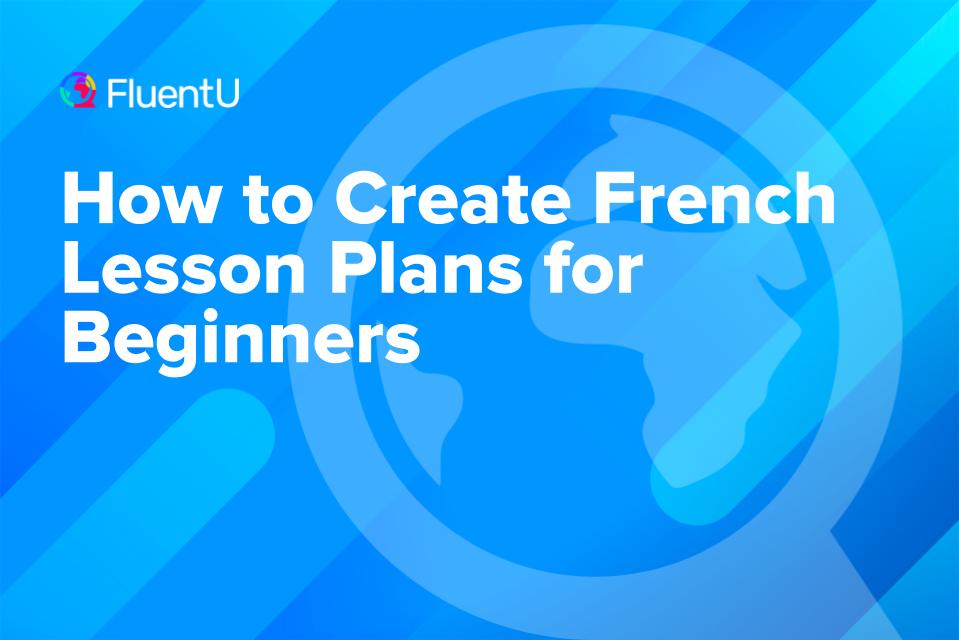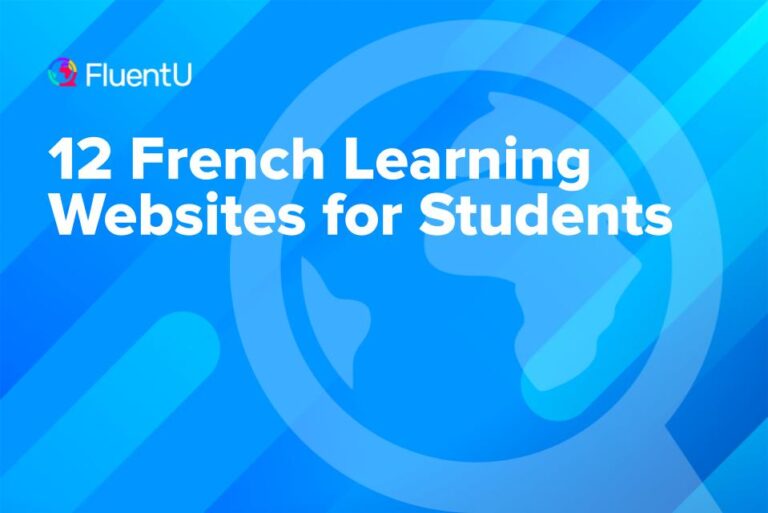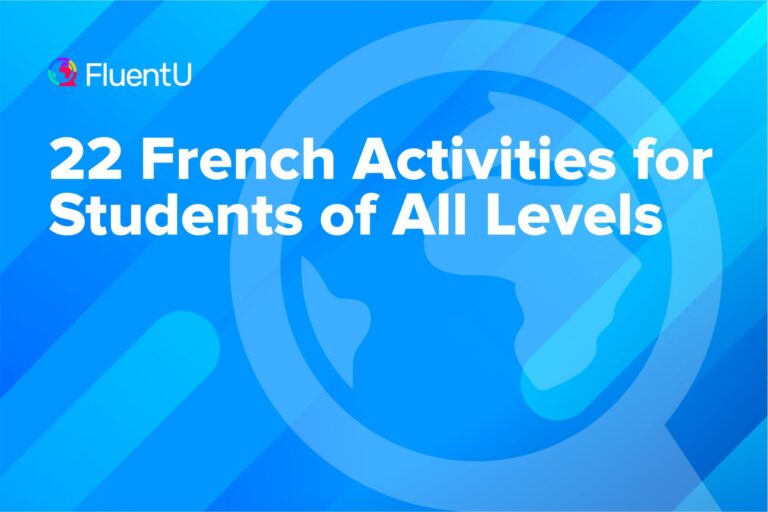How to Create French Lesson Plans for Beginners

Teaching beginners is always exciting—you’re the first person who can really shape their relationship with French.
For that reason, it’s critical that your lesson plans keep your students engaged and confident. Here’s everything you need to know about French lesson plans for beginners in middle school and up.
Download: This blog post is available as a convenient and portable PDF that you can take anywhere. Click here to get a copy. (Download)
The Basic Template for a Beginner French Lesson Plan
I’ll start you off with a hint here: Differentiating learners by age is a fair approach. That’s because age tends to affect their tastes, learning styles, study goals and overall motivation.
Here, I’ll provide you with the methods and resources you’ll need to create great lesson plans for any group of students. You’ll be able to take these methods and resources and apply them to this lesson plan template.
It may seem simple, but simple is what gets the job done!
- Warm-up: Discuss their routine, what they learned in the last lesson and what they’ll learn today
- Lecture: Pre-teach any new words, expressions, verbs or grammar points that you’ll be using today
- Activity: Let students discover the concepts through a game, a song, a video or by telling them a story
- Wrap-up: Verify that students have mastered the objectives by asking them to create sentences using the elements learned during the session
Now, continue reading and drop your new methods and resources into this tried and true lesson plan template!
French Lesson Plans for Middle/High School
Middle school and high school students who are starting with French often do so because they believe that learning this language will enhance their future prospects, both academic and professional. And they’re right!
However, most of them believe that French is a difficult, complex language.
If you’re able to convince them that this isn’t the case, you’re almost guaranteed raving success and motivated, engaged learners who have decided to stick with it and are in it for the long haul.
It’s important to opt for lesson plans that focus on real-life situations and promote immediate, natural usage of the words and expressions they learn in the classroom.
For example, add sports shows, cooking classes or French movies into your lesson plans to captivate your audience if this is what they like. Don’t be afraid to ask them to share their particular interests with you at the beginning of the school year. This will reinforce your desire to work with them and have consideration for who they are.
Several sites let you access lesson plans for beginners of this age group.
- Pinterest is a great way to start if you’re looking for personalized content. Rather than finding well-structured, formal lesson plans, you’ll find lots of materials and ideas to create your own, custom lesson plans for middle school and high school learners.
- This board, for example, is a goldmine for great content, as it includes lots of highly visual, colorful, well-organized French materials that you can include in your French classroom.
French Lesson Plans for Adults
A prevailing myth in the language education community is that adults are at a disadvantage when it comes to learning languages. This couldn’t be further from the truth.
Adults may have less brain plasticity than younger students, but they tend to make up for it with massive personal motivation.
For them, the best lesson plans are those that are to the point and results-oriented. Ask them about their interests and motivations for learning French so you can find the best possible lesson plan and apply it in the classroom setting. It’ll help them validate their interest in the language and commitment to their studies.
Many sites offer beginner lesson plans for adults.
- I particularly recommend Talk French by the BBC, which covers the basics efficiently and expertly. Lessons are organized into topics, including Greetings, Food and Drink and talking about Where You Live And Work. You’ll appreciate that all lessons come with free, downloadable PDFs matching the topics in question.
- Another noteworthy site is Pimsleur Approach: It includes a wealth of lesson plans organized by topics with a strong cultural component, perfect to captivate an adult audience! Lesson plans are accompanied by worksheets and quizzes, and available as PDFs. Interesting plans include The Future, Culinary Culture, Jobs and Family.
French Lesson Plans for Business Learners
Teaching beginner French to students with business-oriented language goals can seem challenging at first.
It’s often tempting to use a cookie-cutter approach and try to teach general, elementary vocabulary rather than introduce business concepts in a simple, approachable way. It’s also quite tempting to cut out the business element of things altogether and try to teach the basics in a more general way. However, you can find a happy balance between the two.
To achieve this, make sure that your lesson plans target the vital linguistic elements that your students will commonly employ in the workplace. Focus on their industries and adjust accordingly.
It’s a good idea to do some research on the technical jargon and buzzwords that they’ll need to know to communicate. This will ensure their ability to communicate about their business problems and ideas while also allowing them to have a conversation in French.
Tips for Designing a French Lesson Plan for Beginners
Create interactive classes
Beginners respond especially well to lively, engaging classes.
There’s nothing more overwhelming than a monotonous session studying grammar and memorizing long vocabulary lists, or just listening to the teacher talk and talk. Instead, try to recreate immersion to expose your students to the many facets of the French language.
Technology can help you create captivating, modern lesson plans and incorporate a wealth of authentic, multimedia content in your lesson plans.
For instance, you can use the internet to curate approachable materials for beginners, like social media posts, YouTube videos, popular songs, topical news articles or even simple ads for cool products.
If you’re not sure where to start, a program like FluentU can help automate some of this process.
FluentU takes authentic videos—like music videos, movie trailers, news and inspiring talks—and turns them into personalized language learning lessons.
You can try FluentU for free for 2 weeks. Check out the website or download the iOS app or Android app.
P.S. Click here to take advantage of our current sale! (Expires at the end of this month.)
Focus on manageable objectives for each lesson
It’s always easier to break down difficult concepts into chunks spread out over several sessions than attempt to tackle the beast in one, long shot.
French grammar is a mammoth. The present tense alone, with three different groups and plenty of irregular verbs, may take some time for beginners to become comfortable with. That’s why it’s absolutely fine to discuss one big point like this throughout multiple classes. It’s also a good idea to start simple and build on the basics with more complex ideas in later classes.
For example, if you’re teaching students how to differentiate between the three different French verb groups, it’s perfectly fine to start with first group verbs for one week and then gradually introduce second and third group verbs over the coming weeks.
Stimulate all four language skills
A great French beginner lesson plan targets speaking, listening, reading and writing skills
Be mindful that, especially if your students aren’t naturally immersed in an environment where they’re exposed to the French language, teaching pronunciation rules and practicing their accents is a must.
Many students who have never studied with a French teacher may not know what the French accent is like. It’s common for these students to make pronunciation mistakes, to not know about the French-language concept of the liaison and to be tempted to pronounce every letter within every word.
Honestly, it’s a lot harder to help intermediate students who have taken on bad habits than it is to teach pronunciation to inexperienced learners. That’s why setting the foundations right from the start is critical.
Solidify the basics
Keep your lessons varied so that you rapidly cover the basics of the French language.
Your lesson plans should equip students very quickly with the essential tools to start communicating simple ideas with confidence. The sooner they can start participating in French, the better!
A good strategy is to ask students to make general observations in an introductory session rather than teach the rule directly. This is the time to focus on the main, general rules so they understand how French works.
Then, devote the next sessions to exceptions and subpoints. Again, don’t just lay it out for them. Ask students to compare the exceptions with the general rules. Rather than wasting time trying to explain why it does or doesn’t make sense, help them find systems to memorize the exceptions, like mnemonics and word associations.
More Resources for Creating French Lesson Plans
BrightHub Education
This terrific site offers a vast collection of French lesson plans for learners across all levels of fluency, including preschoolers, elementary school students and teenage learners. Plans are created for and by teachers and feature an abundance of tips that truly walk you through each activity so you can use them in the classroom without breaking a sweat.
I particularly love how each lesson plan is targeted, so your students can truly focus on assimilating and digesting a grammar point or the theme for a given lesson. What’s more, they’re also highly engaging and do a great job diversifying the activities from one lesson to the next, including everything from songs and poems to games.
Quia
This especially helpful platform lets French teachers share lesson plans that can be used by other French teachers around the world. Interactive and colorful, lessons often include a gamified approach to keep your students engaged throughout the session. This offers them plenty of practice while also making lessons more targeted, effective and fun.
What’s more, you can truly customize your lesson plan by including different activities. By searching for a particular keyword in the search bar, you can see all the activities for a given topic, such as Halloween. You’ll have plenty of games, quizzes and other cool activities to support your lesson.
Civilisation Française
This illuminating French website features an extensive list of lesson plans that are accessible directly from the homepage, and which are organized by themes with a strong cultural focus. The site’s mastermind, Marie Ponterio, is a native French speaker and teacher who emigrated to the United States in 1975.
Each lesson plan is designed to improve your students’ French language skills by combining immersion with highly visual activities. They include lots of pictures, text, videos and exercises, and a list of external resources to help you go beyond what is offered on the site. I particularly love her lesson plan for French food, which offers lots of captivating aspects about French dining etiquette and gastronomy.
Now that you have great tools and materials for beginners of all ages, you should be all set to start creating your own beginner lessons.
I hope you have a lot of fun teaching and passing on your incredible knowledge of the French language!
And one more thing...
If you like learning French on your own time and from the comfort of your smart device, then I'd be remiss to not tell you about FluentU.
FluentU has a wide variety of great content, like interviews, documentary excerpts and web series, as you can see here:

FluentU brings native French videos with reach. With interactive captions, you can tap on any word to see an image, definition and useful examples.

For example, if you tap on the word "crois," you'll see this:

Practice and reinforce all the vocabulary you've learned in a given video with learn mode. Swipe left or right to see more examples for the word you’re learning, and play the mini-games found in our dynamic flashcards, like "fill in the blank."

All throughout, FluentU tracks the vocabulary that you’re learning and uses this information to give you a totally personalized experience. It gives you extra practice with difficult words—and reminds you when it’s time to review what you’ve learned.
Start using the FluentU website on your computer or tablet or, better yet, download the FluentU app from the iTunes or Google Play store. Click here to take advantage of our current sale! (Expires at the end of this month.)
Download: This blog post is available as a convenient and portable PDF that you can take anywhere. Click here to get a copy. (Download)





